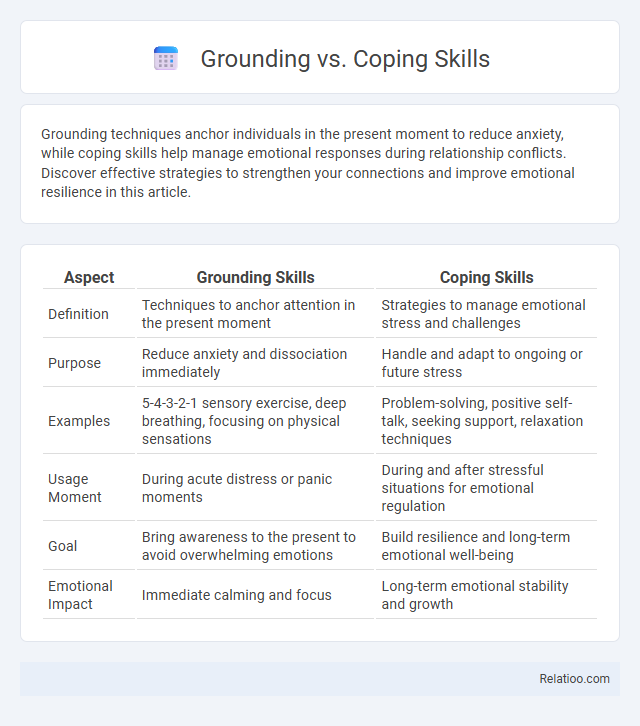Grounding techniques anchor individuals in the present moment to reduce anxiety, while coping skills help manage emotional responses during relationship conflicts. Discover effective strategies to strengthen your connections and improve emotional resilience in this article.
Table of Comparison
| Aspect | Grounding Skills | Coping Skills |
|---|---|---|
| Definition | Techniques to anchor attention in the present moment | Strategies to manage emotional stress and challenges |
| Purpose | Reduce anxiety and dissociation immediately | Handle and adapt to ongoing or future stress |
| Examples | 5-4-3-2-1 sensory exercise, deep breathing, focusing on physical sensations | Problem-solving, positive self-talk, seeking support, relaxation techniques |
| Usage Moment | During acute distress or panic moments | During and after stressful situations for emotional regulation |
| Goal | Bring awareness to the present to avoid overwhelming emotions | Build resilience and long-term emotional well-being |
| Emotional Impact | Immediate calming and focus | Long-term emotional stability and growth |
Understanding Grounding and Coping Skills
Grounding and coping skills are essential techniques used to manage stress, anxiety, and emotional distress by helping individuals stay present and regain control. Grounding skills focus on reconnecting your senses to the current moment through methods like deep breathing, sensory exercises, or mindfulness, which anchor your awareness and reduce overwhelm. Coping skills encompass a broader range of strategies, including problem-solving, seeking support, and cognitive reframing, empowering you to effectively handle challenging situations and emotions.
Key Differences Between Grounding and Coping
Grounding techniques focus on anchoring individuals in the present moment by using sensory awareness or mindfulness methods to reduce distress, whereas coping skills encompass a broader range of strategies aimed at managing and adapting to stressors or emotional challenges over time. Grounding is typically an immediate, short-term intervention to interrupt overwhelming feelings or dissociation, while coping skills include both short- and long-term approaches such as problem-solving, emotional regulation, and support-seeking. The key difference lies in grounding's emphasis on present-moment sensory connection versus coping's comprehensive approach to psychological resilience and stress management.
The Science Behind Grounding Techniques
Grounding techniques activate the body's parasympathetic nervous system by engaging the senses to anchor individuals in the present moment, reducing anxiety and dissociation. Scientific studies reveal that these methods modulate the amygdala's response to stress, promoting emotional regulation and cognitive clarity. Unlike coping skills, which broadly include cognitive and behavioral strategies to manage stress, grounding focuses specifically on sensory input to interrupt traumatic or overwhelming thoughts.
Core Types of Coping Skills
Core types of coping skills include problem-focused coping, which involves actively addressing the source of stress, and emotion-focused coping, which manages emotional responses to stressors. Grounding techniques, an essential subset of coping skills, help you stay present and reduce anxiety by reconnecting with the here and now through sensory awareness or physical actions. Understanding these distinctions enhances your ability to effectively manage stress and improve emotional resilience.
When to Use Grounding vs Coping Strategies
Grounding techniques are most effective during moments of intense emotional distress or dissociation to quickly bring Your focus back to the present reality. Coping strategies are broader and used over time to manage stress, regulate emotions, and maintain mental health through adaptive behaviors. Use grounding for immediate relief and coping skills for ongoing emotional resilience.
Benefits of Practicing Grounding Skills
Practicing grounding skills improves emotional regulation by anchoring individuals in the present moment, which reduces anxiety and overwhelming feelings. These techniques enhance mindfulness and sensory awareness, enabling better control over intrusive thoughts and emotional distress. Regular use of grounding skills supports resilience and mental clarity, promoting overall psychological well-being.
Benefits of Building Coping Mechanisms
Building coping mechanisms enhances your ability to manage stress effectively by promoting emotional resilience and reducing anxiety levels. Unlike grounding techniques that focus on immediate sensory awareness, coping skills provide long-term strategies to navigate challenges and maintain mental well-being. Developing strong coping mechanisms benefits overall psychological health by enabling adaptive responses to adversity and fostering greater control over emotional regulation.
Examples of Effective Grounding Exercises
Effective grounding exercises include the 5-4-3-2-1 technique, where one identifies five things they see, four they touch, three they hear, two they smell, and one they taste, enhancing present-moment awareness. Another example is deep breathing combined with sensory focus, such as feeling the texture of an object or noticing the temperature of the air, which can quickly interrupt distressing thoughts. Engaging in physical grounding, like stomping feet or holding a cold glass of water, helps reorient attention from emotional distress to the immediate physical environment.
Common Coping Skills for Stress Management
Common coping skills for stress management include deep breathing, progressive muscle relaxation, and mindfulness meditation, which help regulate your emotional response. Grounding techniques, such as focusing on physical sensations or the environment, anchor you in the present moment and reduce anxiety symptoms. Both coping and grounding skills work together to provide immediate relief and long-term resilience against stress triggers.
Integrating Grounding and Coping Skills for Wellbeing
Integrating grounding and coping skills enhances your mental wellbeing by providing practical strategies to manage stress and emotional distress effectively. Grounding techniques, such as deep breathing and sensory awareness, help anchor you in the present moment, while coping skills involve adaptive responses to challenges and emotional regulation. Combining these approaches creates a balanced toolkit for resilience, reducing anxiety and promoting emotional stability during difficult times.

Infographic: Grounding vs Coping Skills
 relatioo.com
relatioo.com